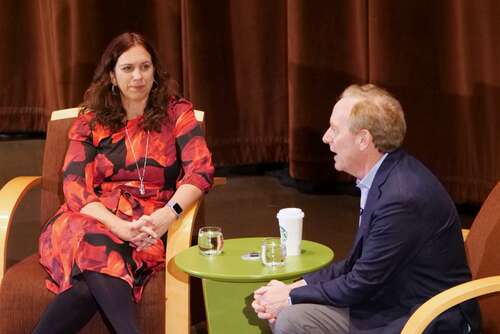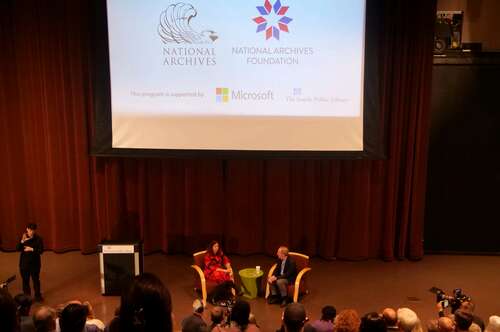
Colleen Shogan, the Archivist of the United States, discussed the National Archives‘ digital transition and use of artificial intelligence as part of a broader public conversation Thursday evening at the Seattle Public Library, led by Brad Smith, the Microsoft president, and organized by the National Archives Foundation.
- The National Archives is training an AI bot to extract the DD-214 forms that summarize a person’s military record from large digital files, freeing up staff to work on more complicated requests.
- To streamline responses to Freedom of Information Act (FOIA) requests, the National Archives is in the early stages of working to implement AI to automatically redact personally identifiable information.
- For the 250th anniversary of the Declaration of Independence in 2026, the Archives is working with Microsoft to develop an interactive exhibit that will provide a personalized experience using AI. Visitors’ interests will be used to recommend relevant records to them.
- The Archives is experimenting with different ways to adapt to new digital platforms. For example, when the Emancipation Proclamation was on display for Juneteenth, the Archives invited social media influencers create videos about it for platforms like TikTok, Instagram, and Twitter.
The Archives is also digitizing records to make them more accessible online. Currently about 250 million records are available digitally out of over 13.5 billion total pages of records. The goal is to increase this to 300 million and eventually 500 million records digitized. Originals are preserved after scanning, Shogan said.
In the process of digitizing files, the Archives is conscious of using file formats not tied to specific software, Shogan said. “Computer programs and applications will come and go, but we need these files to outlive those actual applications so they can be viewed for generations to come,” she said.
The National Archives is also transitioning to taking in and preserving more records that were “born digital” and will remain in digital format rather than needing to be scanned in from print documents.
Shogan, an author and historian, was sworn as the eleventh Archivist of the United States in May 2022. She has a PhD in political science focused on presidential leadership and rhetoric. She previously served as the senior vice president and director of the David Rubenstein Center at the White House Historical Association, and worked for the U.S. Senate and as a senior executive at the Library of Congress.

For many people in the Seattle audience, her visit was important symbolically as a show of support for the Seattle office of the National Archives, which was proposed to be sold and closed in 2020 before the decision was reversed.
As part of her trip, she visited the Seattle facility, which holds 150 million records.
“The diversity of records is really amazing,” she said, citing the Seattle facility’s holdings of court and tax records, World War II-era photographs, and investigative records. Describing herself as “a little bit of a mystery fan,” Shogan said she was especially excited to see the office’s records of the 1971 D.B. Cooper plane hijacking.
One topic that did not come up directly during her public talk was the National Archives’ involvement in the legal case over classified documents allegedly found at former President Donald Trump’s Mar-a-Lago resort.
However, Shogan displayed her sense of humor when Smith read a submitted audience question about how the Archives handles misplaced documents. In rephrasing the question, Smith said he wasn’t going to ask about items that might get lost in gym bags, or closets, or …
“Bathrooms?” Shogan added, to laugher from the crowd.

